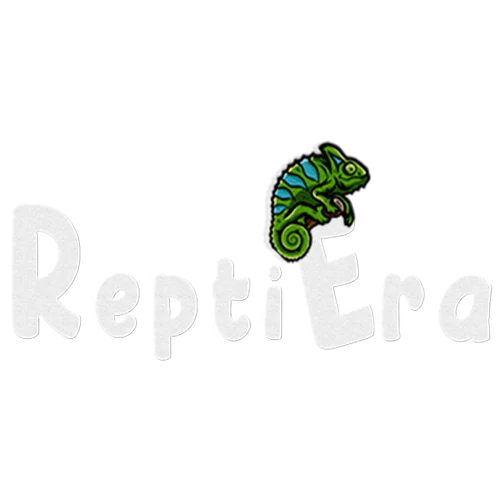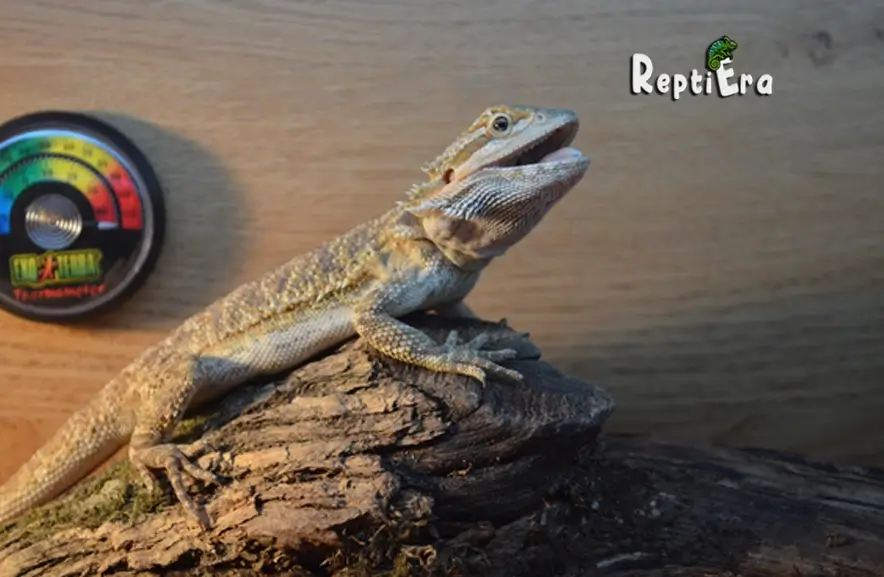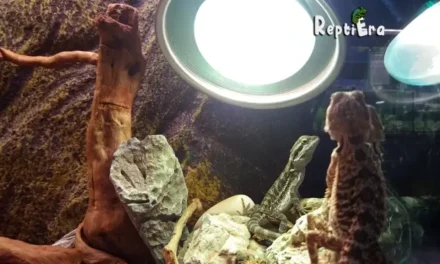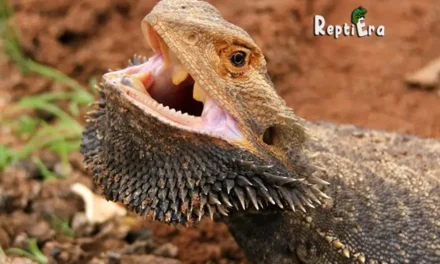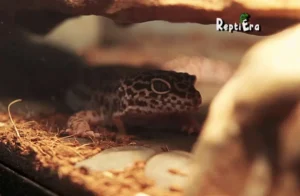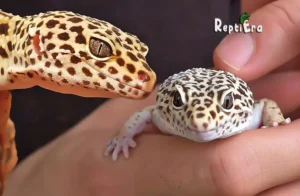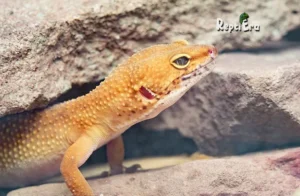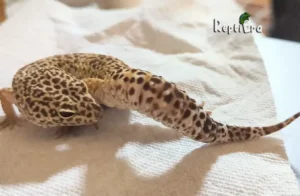While bearded dragons are known as low-maintenance pets among reptiles, there are a few important things to keep in mind to ensure they stay healthy. Food, environment, and lighting are critical factors that an owner must pay close attention to. DO I Left My Bearded Dragons Lights On All Night?
If something goes wrong, like realizing you’ve left the lights on all night, don’t panic. Luckily, your bearded dragon won’t suffer serious health consequences from a single mishap, but it could disrupt their sleep schedule for a few days. Using a timer can help regulate this process and prevent such a mistake in the future.
This article will discuss how to manage if you inadvertently leave your beardie’s lights on and outline the best setup to prevent accidents. Even if you consider yourself a pro, it might be beneficial not to skip this first section and instead head straight to our step guide to ensure it doesn’t happen again.
Table of Contents
Why You Have To Turn Off Their Light At Night
Leaving the light on in your bearded dragon’s enclosure at night can disrupt their sleep, as these sensitive reptiles need a cycle of light and darkness to mimic their natural habitat. Just like turning off a bedroom light helps us get to bed, a dark environment is essential for them. A bright enclosure makes it difficult for them to rest, since light serves a purpose during the day but should be turned off at night to ensure their well-being.
Understanding Bearded Dragon Lighting Needs
Bearded dragons need a good lighting setup for three main purposes:
1- Proper nutrient synthesis
UVB lighting is important for the synthesis of vitamin D3, which helps a bearded dragon absorb calcium from its food, ensuring proper bone health. Without it, they may suffer from Metabolic Bone Disease, which can cause deformities or even death. Nutrient deficiencies are often gradual, giving owners time to detect and take appropriate measures early on to prevent long-term damage.
2- Temperature regulation
For temperature regulation, bearded dragons require both UVB lighting and a basking light that provides both heat and light, enabling the dragon to regulate its body temperature effectively. The basking light should be placed at one end of the enclosure, allowing the beardie to move between cooler and warmer areas as necessary.
It’s recommended to use a bulb that emits both UVA and UVB radiation; however, if this isn’t possible, a separate UVA bulb can be used. Ensure the total area covered by the basking light does not exceed 25-30% of the enclosure’s total surface, so your beardie can leave the basking spot with ease when necessary.
Related Post: DO BEARDED DRAGONS NEED HEAT AT NIGHT?
3- Performing natural activities
UVA lighting is important for a bearded dragon’s overall well-being, as it’s essential for their daily activities such as eating, basking, and regulating their body temperature. Without proper exposure to UVA, dragons can become confused about the time of day,
which can mess up their resting pattern and have severe consequences. Disrupting a lizard’s normal circadian rhythm can cause significant stress, destroy the animal’s quality of life, and in extreme cases, be fatal. Ensuring your bearded dragon receives adequate UVA light during the day helps maintain its natural behaviors and health.
When selecting lighting for your bearded dragon, it’s important to choose a full-spectrum UVB bulb that emits UVB radiation within the 290-320 nanometer range, as this spectrum is crucial for their health. These bulbs should be replaced every 6-12 months because the output of UVB decreases over time, even if the bulb still produces visible light.
The bulb should be placed in a fixture that allows your dragon to get as close as possible to the light without the risk of touching it, as accidents can happen, leading to burns, overheating, discomfort, and stress for your pet.
Do Bearded Dragons Need Heat At Night
Contrary to popular belief, bearded dragons do not always require heat at night as they do during the day. In their natural habitat, these creatures experience hot, humid days and relatively cool temperatures when they cool off at night. A well-insulated tank that has been thoroughly heated during the day should hold enough warmth to prevent the tank from becoming too cold overnight, mimicking the reptile’s wild conditions.
However, in a colder climate or if your house tends to get colder than the ideal range between 65-75°F, a secondary heat source may be necessary to keep your bearded dragon comfortable without disrupting its natural cycle. Generally, if the environment doesn’t drop below these temperatures, additional nighttime heating won’t need to be a concern.
What Happens When You Leave Your Bearded Dragon’s Lights On All Night?
The good news is that your bearded dragon will likely be fine after a single incident, provided it doesn’t become a habit. However, the light left on all night might leave your pet tired and not in the best mood, acting out of character due to disrupted sleep and a thrown-off schedule.
You might be under the impression that turning off the lights and keeping the blinds closed during the day will help your dragon recuperate, but sudden changes can further disturb its routine. Ensure the room is well-lit during the day and dark at night to maintain a healthy sleep cycle for your beardie.
What To Do If You Left Your Bearded Dragon’s Light On All Night. (4 Steps)
If you’ve left the lights on in your beardie’s enclosure all night, there’s no need to worry; it happens. Whether you were on a trip and the timer stopped working, or the pet sitter didn’t come by, your bearded dragon has gotten 24 hours of light straight but can recover with the right steps.
Here are some simple steps to make your beardie more comfortable!
Step 1: Don’t Panic
If you’ve accidentally left the light on overnight in your bearded dragon’s enclosure, don’t panic; it’s not the end of the world. This situation is somewhat equivalent to falling asleep with the lights on— not ideal for the best night of sleep, but you’re still able to fall asleep.
Most likely, your beardie has spent the night with the lights on but managed to sleep, especially if they have a good setup with a hide to shield themselves from being exposed to light all night. If you’ve only left the light on for one night, there’s no need to worry; however, if the lights have been left on for multiple nights in a row, your pet may be okay but could be a bit tired and dehydrated after nights of exposure.
Related Post: WHY DO BEARDED DRAGONS PUFF UP?
Step 2: Consult your Veterinarian If Needed
If you notice any behavioral changes in your bearded dragon after having left the lights on for multiple nights in a row, feel free to give your veterinarian a call. It’s never a bad idea to talk to a professional who knows when a reptile needs medical attention. Even if your dragon seems fine, it can be comforting to talk with someone about the incident, and it’s especially a good idea to consult a vet to ensure the continued health and well-being of your pet.
Step 3: Get Your Bearded Dragon Back On A Normal Sleep Schedule
The next step to rectify the situation is to try getting your beardie back to a normal sleep schedule. If the lights were left on for just one night, simply turn off the lights a bit earlier the following night to give your bearded dragon some extra time to catch up on the missed sleep; a few hours should be fine.
However, if this happens for multiple nights, consider turning off the lights even earlier and gradually scaling back, day by day, to ease your pet back into its regular rhythm without causing further disruption.
Step 4: Make Sure It Doesn’t Happen Again
To avoid future lighting issues, our top recommendation is to invest in a timer for your light setup. Timers can automate your reptile lights and maintain schedules even when you’re not at home, ensuring the lights turn on and off at appropriate times. You can easily find outlet timers at most pet supply stores, and they’re generally easy to set up.
Consider watching a 2-minute video tutorial to get hooked up quickly. This is the best way to make sure you don’t overdo the lighting, especially useful when traveling or if you’re out late. Ultimately, using a timer not only simplifies your life but also makes your pet’s life much easier and stress-free.
What Lights Should A Bearded Dragon Have On During The Day?
Bearded dragons, as pets that originated from the Australian desert, thrive in a natural climate that’s hot and dry during the day and cool in the evening. In the wild, they are accustomed to basking in the sun and hiding under a rock at night, which is why their enclosure setup should mimic this natural history.
During the day, your beardie requires one or two lights that serve two main functions essential for their well-being. These can be supplied by either one light capable of providing both or two different sources to cater to their needs. This ideal scenario ensures they don’t get exposed to light all night, which is crucial for maintaining their health and mimicking their natural environment.
UVA/UVB Light
For bearded dragons and other pet reptiles, a source of UVA/UVB lighting is crucial, not just any light will do. Unlike nocturnal reptiles that avoid the sun and do not require such lighting, beardies spend their days basking in the sun, making UVA/UVB light a necessity for their life in captivity.
These lights provide essential spectrums of light that are important for bodily functions; UVB aids in the synthesis of vitamin D3, crucial for calcium absorption, preventing metabolic bone disease, characterized by symptoms like twitching and weak bones. A light that emits both UVA and UVB rays is ideal, and ensuring your beardie gets some outside time on sunny days under supervised conditions can also benefit them.
However, it’s important to leave the UVA/UVB light on for only about 12 hours to not disrupt their sleep schedule and keep them awake longer than necessary, helping to fix their schedule effectively.
Basking Light
A basking light or heat lamp is vital lighting to provide your bearded dragon with the warmth it craves, akin to the warm sun of its native desert habitat. These desert reptiles are built to thrive in warm environments, and their tank should be kept at optimal temperatures, with the basking area specifically designed to hit higher temperatures for proper thermoregulation.
It’s important for not only keeping them warm but also for regulating their sleep schedule, working in tandem with UVA/UVB light.
However, leaving a basking light on all night can make the environment too warm and uncomfortable for your pet. If left overnight by mistake, the issue can be easily fixed by ensuring the light is only left on for the recommended 12 hours to mimic the natural cycle of desert days and nights.
Why do basking lights need to be off?
Pet owners may constantly leave basking lights on, but it’s clear they are not needed at night time for bearded dragons. That’s right, they simply don’t need it; turning them off is one of the main reasons to help them sleep properly.
Did you know? Bearded dragons are sensitive to lighting, so it’s advised to fully switch off the lights.
Impact of Light Pollution on Bearded Dragon Health
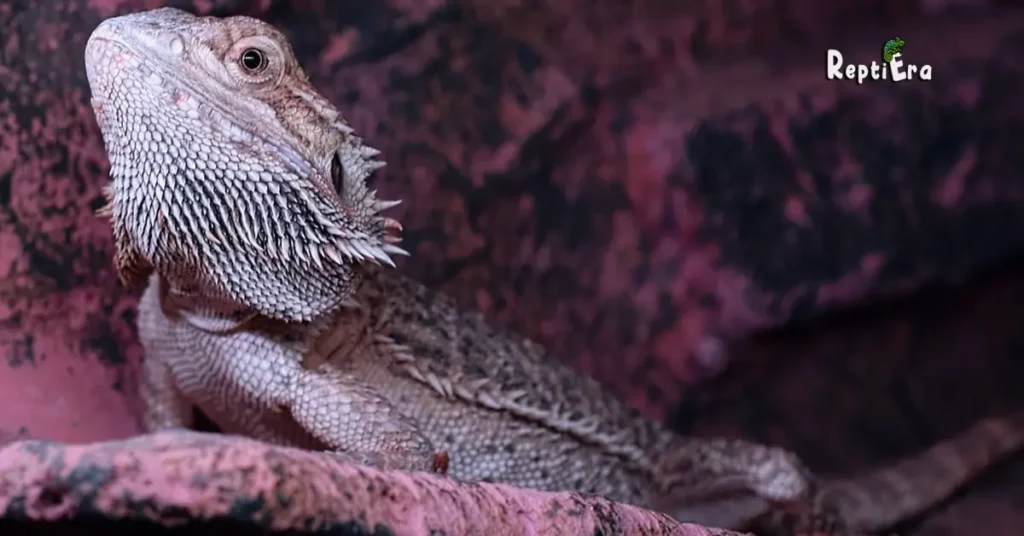
Light pollution has a significant impact on the health of bearded dragons, as these reptiles are highly sensitive to the amount and type of light they are exposed to. Prolonged or improper exposure to artificial light at night can disrupt their natural day-night cycle, leading to a range of health problems. It’s crucial for their well-being to ensure they experience dark periods that mimic their natural habitat to maintain their circadian rhythm and overall health.
Here are a few notable ones:
Impacting the sleep pattern:
Just like humans, bearded dragons require periods of darkness during the day to promote healthy sleep patterns. Exposure to constant light can prevent them from getting the rest they need, leading to stress, decreased appetite, and weakened immune systems, which in turn increase their susceptibility to disease and infections, making it difficult for them to recover from illnesses.
All animals, at a biological level, are impacted in a similar manner by disruptions to their natural sleep cycles, underscoring the importance of maintaining a naturalistic light-dark cycle in captive environments.
Hormonal imbalances:
Light pollution can significantly affect the hormonal production in bearded dragons, leading to reproductive problems as these reptiles require specific light conditions to trigger the production of reproductive hormones, which are essential for egg-laying and mating.
Exposure to constant light can disrupt these hormonal processes, potentially resulting in infertility and decreased libido, and can also regulate their behaviors, making them erratic, restless, overenergetic, or even aggressive. A proper day-night cycle is crucial to rest their system and prevent them from becoming hyperstimulated by excessive lighting.
Heat-related problems:
Light pollution in a bearded dragon’s enclosure can cause overheating, which is harmful to their health and can decrease the reptile’s immune system, opening the door to an array of problems. The inability to cool down can lead to dehydration, a condition that impacts reptiles more severely than other animals.
Prolonged exposure to excessive heat can cause bearded dragons to experience irreversible damage or become dehydrated within a day, highlighting the critical need for proper temperature regulation in their habitats.
Disrupting the natural patterns and behaviors:
Finally, light pollution can disrupt the behavior and feeding patterns of bearded dragons, as in the wild, they rely on natural light cycles to regulate their metabolism, behavior, and feeding patterns.
Exposure to artificial light at night can confuse their internal clock, leading to stress, decreased appetite, and behavioral problems, which are concerning within the bearded dragon community. Unnatural lighting patterns can stress out your beardies, causing them to fight or attempt to escape the enclosure, highlighting the importance of adhering to natural light cycles for their well-being.
Light pollution can be just as harmful as going without food, suffering from lack of water, and experiencing stress, needing equal attention and control.
Risks of Overexposure to UVB and UVA Light
While UVB and UVA lighting are essential for bearded dragons to maintain their health, overexposure can be harmful and lead to a variety of health problems. UVB radiation can cause hypercalcemia, an excessive buildup of calcium in the blood, leading to dehydration, lethargy, decreased appetite, and calcium deposits in the kidneys, potentially resulting in renal failure and other life-threatening complications.
Similarly, too much UVB can also cause sunburn and skin problems, such as peeling, flaking, and discoloration of the skin, increasing their susceptibility to infections.
On the other hand, UVA radiation can induce stress, cause eye problems like cataracts and retinal damage, leading to vision loss, and disrupt behavior and feeding patterns by confusing their internal clock, causing behavioral changes and an increased tendency to escape the enclosure.
What Lights Should A Bearded Dragon Have On At Night?
At night, bearded dragons typically do not require lights in their enclosure, as night lights or red lights are not needed for these reptiles to sleep comfortably. A temperature-regulated enclosure that maintains adequate warmth is sufficient, meaning the basking light should be turned off.
In a colder climate or building, you might need to supplement the overnight heat with a ceramic heat lamp that does not emit light or use a heating pad under the tank to ensure your bearded dragon stays warm enough without disrupting its natural nocturnal rest. If you’ve inadvertently left a light on all night, simply ensuring the enclosure returns to its dark, restful state the following evening will help your pet readjust.
Tips for Keeping Your Bearded Dragon Safe at Night
Keep in mind that your beardie’s nighttime safety involves more than just managing the lights.
In fact, there are multiple factors to think about, like:
Provide a secure enclosure:
For bearded dragons, having a secure enclosure is vital to prevent escape and protect them from potential predators. It’s essential that the enclosure is properly sealed and locked at night to ensure their safety without impacting the habitat’s ventilation. Covering the enclosure with a thick tarp made of a material that allows fresh air to circulate can offer an extra layer of security while maintaining a healthy environment for your reptile.
Turn off unnecessary lights:
Bearded dragons require a period of darkness during the day to promote healthy sleep patterns. It’s crucial to turn off any unnecessary lights at night and avoid shining a bright light into their enclosure as it can cause stress and adversely affect their behavior. Ensuring a dark environment helps mimic their natural habitat, contributing to their overall well-being.
Maintain proper temperature:
Bearded dragons require specific temperature ranges to maintain their health, so it’s crucial to make sure the temperature in their enclosure stays within the recommended range of 75-85 F for ambient temperature and 95-105 degrees F for basking temperature. Avoid overheating, as it can cause dehydration and other health problems. The presence of a thermometer is a must to monitor these conditions closely and ensure the well-being of your pet.
Monitor humidity levels:
Bearded dragons require specific humidity levels to prevent dehydration and promote healthy skin and shedding, with the recommended range being 30-40%, which is relatively low for reptiles but makes sense for these desert-dwelling species. To ensure these conditions, use a hygrometer to monitor the humidity levels in their enclosure and mist their ecosystem when necessary, typically 1-2 times a day, to maintain the optimal environment for their wellbeing.
Provide appropriate bedding:
For bearded dragons, appropriate bedding is essential to prevent injury and promote hygiene. Avoid substrates like sand or soil that can cause impaction or bacterial growth. Instead, use reptile carpets or paper towels as safe options that offer comfort, additional safety, and moisture-retaining properties. It’s vital to prioritize practicality over aesthetics; while a natural-looking enclosure might be more visually appealing, the health and safety of your pet should always come first, which is just common sense you can trust.
Keep them away from other pets:
Bearded dragons should be kept away from other pets at night, as many animals may view them as prey and attack, causing injury and stress. Even if such incidents don’t happen and your pets appear friendly, their mere presence can still stress out your beardies, preventing them from resting peacefully. Their wellbeing must have a safe, undisturbed space, especially during their night-time rest.
Also Read: HOW FAST CAN A BEARDED DRAGON RUN?
Monitor their behavior:
Monitoring your bearded dragon’s behavior and physical condition regularly is key to ensuring their well-being, especially after incidents like leaving the lights on all night. Look for any signs of stress, dehydration, or illness, and be ready to take appropriate action if necessary. The earlier you detect any issues, the easier it will be to address and correct them, preventing minor concerns from escalating into more significant health problems.
How To Prevent This From Happening In The Future?
After experiencing the scare of leaving the lights on all night for your bearded dragon, you might think it’s enough to remember not to repeat the mistake, but being human, we know how easily an emergency can arise or how a simple desire to want an overnight visit away from the house can disrupt our plans.
Nobody’s perfect, and sometimes we don’t have anyone to care for our bearded dragon’s light situation. The most foolproof of all solutions is to invest in an automatic timer for the enclosure’s lights, removing the worry of affecting your reptile’s sleep schedule and ensuring life gets a little better and easier for both of you.
Once you set the timer, it takes care of turning the lights on and off, making it one less thing to worry about in your busy life.
FAQs
Do bearded dragons sleep at night?
Yes, bearded dragons do sleep at night time, relying on their sensing of lights to cue their sleep cycles. It is required to turn off the lights completely in their habitat to ensure they get the rest they need.
What happens if bearded dragons get too cold?
If a bearded dragon becomes too cold, it will struggle to digest its meals, which could lead to food rotting inside its body, eventually resulting in unimaginable health issues.
How long do you keep the lights on for a bearded dragon?
Keeping the lights on for a bearded dragon should be around 12-14 hours a day to mimic their natural environment. Making your life easier by setting a timer can ensure a consistent light cycle without manual intervention.
What if I forgot to turn off my bearded dragon light?
If you forgot to turn off your bearded dragon’s light, simply go back to the regular schedule; an occasional chill might stress their immune system. If your pet develops symptoms like coughing, eye or nose discharge, or appetite loss, consider consulting a vet, but in most cases, chances are nothing will happen. Just keep an eye on him to ensure his well-being.
Does my bearded dragon need heat at night?
If your home drops below 15°C (59°F), supplementary overnight heating is required to keep your Bearded dragon warm; however, if the temperature remains above this threshold, you do not need to provide overnight heat.
Is it safe to leave reptile lights on?
It’s not advisable to keep UVB lights on all the time as it can cause a problem like hypercalcemia, due to too much calcium. After doing some research for your specific animal, a good rule of thumb is to program both UVB and daytime light/heat to be on for 12 hours and then turned off to mimic natural conditions.
How long can a beardie survive without UVB?
A Bearded Dragon can manage a max of two days without the essential UVB lighting, after which health issues may arise. If you can’t leave them in natural sunlight for 8 hours a day, ensuring they have access to a UVB bulb is crucial for their well-being.
Conclusion
Leaving the lights on all night for a bearded dragon can lead to various issues, from disrupting their sleep patterns and causing stress to potential health risks due to overheating or hormonal imbalances. It’s crucial to maintain a proper day-night cycle, with specific periods of darkness to mimic their natural habitat and ensure their well-being.
Implementing a timer can help regulate lighting and prevent such occurrences, ensuring that your bearded dragon’s habitat remains a safe and comfortable environment. Regular monitoring of their behavior, temperature, and humidity levels within the enclosure can also help quickly address any issues that may arise from such incidents. Remember, creating an environment that closely resembles their natural habitat is key to keeping your bearded dragon healthy and happy.
